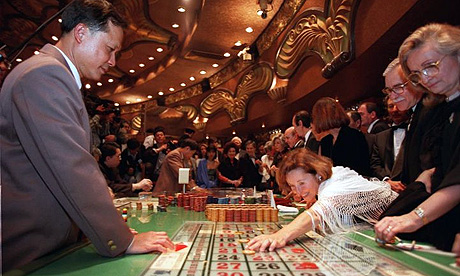Is it the culture? the location? the attractions? or the economy of the city?
Perhaps, we would be more interested in its location first! If you do not know, Macau is located at the Southern part of China, opposite Hong Kong. There are high-speed ferries running between Hong Kong and Macau every half-hour. Hence, when the very next time you visit Hong Kong, do not forget to take the ferry to visit Macau; vice visa.

Culture
Macau has the amalgam of both the Portuguese and Chinese cultures. This is one of the unique points of this small city. You could evident that by both its tangibles and intangibles. The tangibles would include the artistic and rich architecture, temples, catholic churches and various other buildings that could be found at every part of the city. Moreover, when you visit Macau, you could never miss its famous delicacy of Portuguese Tarts!
Whereas, the intangibles would includes festivals that are related to the Portuguese. Annually, there is a festival called the 'Lusofonia Festival', meaning "Portuguese-speaking" festival. People would gather together and enjoy the music and dance of Portugal, seminars and workshops on the study of Portuguese.
The Name
You might also wonder, what does Macau means? Macau came from the word in Chinese A-ma-gao of A-ma, a Chinese goddess. A-ma-gao means the bay of A-ma. The name is being shorten from A-ma-gao to "ma-gao" (The present Macau). This goddess has a temple at the bay of Macau, naming The A-ma Temple. Lots of tourists and even the locals visit the temple for blessing.

In Macau, there is no state religion. The residents has the Freedom of belief and religion which is being protected by a constitutional document called the Macau Basic Law. However, most of the residents are Buddhism. Although Roman Catholicism does influence in education and social welfare of the city, it only hold for about six percent of the population.
Population
The population of Macau has been gradually increasing from approximately 180,000 in 1960s, 300,000 in 1980s, 400,000 in 1990s and to 537 972 in 2009. Majority of the population is Chinese (95%) with only 2% is Portuguese.

The locals do have their meals relatively early. Sometimes, some of the restaurants would have their chefs leaving by 9pm due to the little number of people dining that late. However, if you would to dine at restaurants located at the hotels or tourist attractions, it would definitely close at a later time for the tourists. In Macau, you could get food from Portugal, Macanese to Chinese cuisine.
Portuguese food is usually heavy, meat based and not particularly refined. The common ingredients used in the dishes are olive oil, garlic and dried salted cod (Bacalhau). Also, their meals usually include soups.
Macanese food on the other hand is unique. It is a blend of both Portugal and Chinese cuisine. It uses a wide variety of spices which include coconut milk, cinnamon, wine, star anise and more. The popular dishes are Pork Chop Bun, African Chicken, Stir-fried curry crab and Rabbit stewed in wine. Last but not least it their egg tarts called the Pasteis de Nata.
This is African Chicken which is being marinated in Garlic lemon juice before grilling and being served with coconut white wine sauce.


















